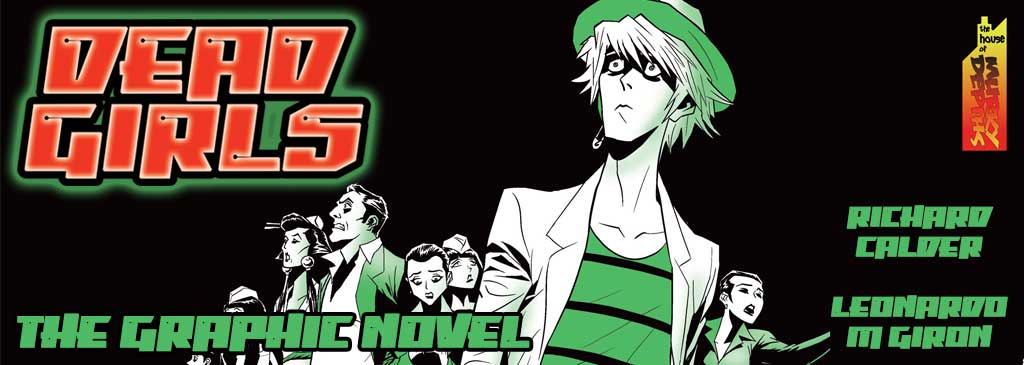
|
Home
SHOP #1 #2 #3 #4 #5 #6 #7 #8 Eight-comic set Graphic Novel SIGNED COPY! Calder interviewed Synopsis • Reviews Panel Art • Fan Art Indiegogo Honours Board Bios Richard Calder Leonardo M Giron Links Contact  “A fiendish futuristic fairytale full of style and invention. A thrilling tale told at breakneck pace with beautiful manga-inspired artwork. Highly recommended.” SFX Dead Girls, the comic-book series, is Richard Calder's adaptation, and radical re-imagining, of his 1992 cult cyberpunk novel of the same name. |
Dead Girls A Graphic Novel by Richard Calder and Leonardo M Giron On Dead Girls - The Novel: 'For nearly 40 years the sf field has been looking for the heir to Alfred Bester, author of such doom-laden classics as The Demolished Man (1953) and The Stars My Destination (1956). A master of baroque pyrotechnics, rapid pacing, cosmopolitan sangfroid and knock-your-socks-off conceptualization, Bester has left traces everywhere, but no solid progeny. Until now. On the evidence of his brilliant debut novel, Dead Girls (St Martin's), Richard Calder bids fair to make off with Bester's mantle of charmed literary omnipotence … The density of allusiveness in this book is astonishing. Tom Sawyer, Pinocchio, Lolita and Frankenstein are all deftly evoked. Proust, Wells, Burgess, Dick and Dickens poke through Calder's sophisticated prose as warped armatures. Historical incidents and eras as diverse as the belle epoque and the Holocaust are replayed as tragic farce. But over all reigns the ghost of J.M. Barrie and his "Peter Pan." Explicitly and implicitly, the oversexed Ignatz and Primavera are a debased Peter and Wendy, icons for a diseased age.' 'Packed with fascinating speculation on tomorrow's economics and technology, European romanticism and quantum reality, Dead Girls is a stunning achievement … This is a terrific first novel and a great start to a trilogy that should enthral.' 'Calder's debut has already been praised by William Gibson and other sf notables as an ingeniously original vision of a technologically and culturally warped twenty-first century … This first part of a planned trilogy is likely to be lavished with attention in the sf community and may herald the arrival of a major new talent.' 'A gender-specific nano-virus threatens humanity with extinction by transforming its female victims into doll-like vampire killing machines. When Ignatz Zwakh tries to protect his former lover Primavera from those who would exterminate her, he falls into a dark web of intrigue and sinister politics. This first novel begins a trilogy that draws its ambience from its cyberpunk underpinnings while manifesting a clarity of vision at once unique and disturbing. Fans of cutting-edge sf will enjoy this taut, provocative debut.' 'Dead Girls is, quite simply, dead good.' 'What Calder can really do is write jewelled and flashing prose, like J.G. Ballard on speed.' 'Calder, who lives in Thailand, seems to have a clear notion of the scope "pornocracy" has reached in the Far East, and his dazzling evocation of the brutally corrupt 21st-century Bangkok and Nongkhai is perhaps the greatest strength of this disturbing novel. Described through prose that is alternately breakneck and overripe, the cities seem as convincing and terrifying as the Calcutta of Dan Simmon's 'Song of Kali' - and what we learn of a depopulated London seems even worse … What helps to make the novel disturbing is that - for a tale which revolves around carnality and desire - there are virtually no human women anywhere in sight. The few grown women are automata, nanoengineered through "fractal programming" down to the quantum level; the girls are "lilim" - born normal, but infected by a nanotech plague, transmitted through their fathers, which gradually transforms them into mechanical nymphets facing an early death, but already biologically "dead." If one believes that the sex industries dehumanize women, Calder offers the most dramatic metaphor yet to show just how this works: his lilim partake of every aspect of the woman-as-alien from Lolita to dominatrix to vampire. The protagonist, Ignatz Zwakh, has been infatuated with one of them, Primavera, since he met her in school while she was still human. Now he has escaped with her from a plague-quarantined London and works as a decoy to set up her targets for murder. Captured by American intelligence agents who want to know how they escaped quarantined London, they become pawns in an international game whose stakes seem to be the survival of humanity as a biological species.' 'Does he succeed? I think so, despite appeals to trendy quantum fractal bafflegab that quite fail to convince. We know how to ignore that in favour of his really quite astonishing high-wire dance of ultimate technological vampires and reductio ad absurdum of the war between the sexes, not to mention racism and bigotry and other human follies.' 'The impossible environment which Calder attempts to describe draws on Lewis Carroll's looking-glass world as well as William Gibson's cyberspace to model its features, and manages to forge the difficult connection between science fiction and English romantic gothic which only Michael Moorcock has really pulled off in the past. Get it today.' 'Wild, daring, confused, brash, pyrotechnic … an intriguing and encouraging debut.' |